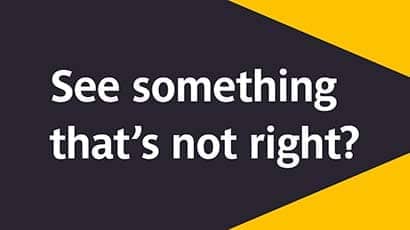Scams and fraud
Information on the common types of fraud and scams and how you can stay safe by avoiding these hazards and pitfalls.
There has been an increase in fraud and scams as life has become more digital and access to money is more instant. Unfortunately, many scams now target students and young people. Scammers may approach you via email, phone, messages, or in-person and communicate in a way that appears very convincing, persuasive, or authoritative.
It is important to understand common types of scams, how to avoid the hazards and pitfalls, and how to stay safe as you navigate student life.
Commons types of fraud
Cybercriminals will often use fraudulent communications such as phishing, smishing and vishing to trick unsuspecting users into sending them their confidential data.
Fraudulent communicationsTake this quick Google phishing quiz to check your awareness and ability to recognise a fraudulent email. You get to make up a fictitious name and email address for the purpose of this quiz – no personal data is gathered.
Money muling
Money muling is a form of money laundering in which criminals pay you to allow a large amount of money to pass into and out of your bank account. It is an attempt by fraudsters and hackers to hide the trail of illegal money from fraud, theft, trafficking, drug dealing or other crime. Some criminals employ young people to visit campuses or attend student events acting as students themselves to befriend new students, gain their trust and recruit them as money mules. Hear about a student's money muling experience in this NatWest video.
This type of money laundering may be presented as an easy way to make money. However, banks collaborate with law enforcement agencies and operate sophisticated software which highlights suspicious transactions within accounts, allowing for the identification of money laundering activity.
The consequences of being caught as a money mule can be a poor credit score and a criminal record for life, resulting in an inability to open a bank account and being declined employment opportunities. It is even possible to go to prison for being a money mule. The impact of the longer-term consequences far outweighs any short-term financial gains.
Beware the lure of ‘easy money’ and allowing access to your bank account. Once you become a money mule, you may not be able to stop; you could be threatened with violence if you subsequently deny criminals any access to your account.
Social media scams
Various scams and hoaxes circulate on social media. One way in which your data might be compromised is through partaking in online social media quizzes – these harvest information about you which criminals save in databases, potentially leading to identity fraud in the future.
Read more from Save the Student: 17 common money scams.
Job and housing scams
These types of scams usually occur when someone responds to a hoax advert for a job or property, posted online or in printed literature. The job may appear to have an excellent salary and rewards package or offer the ideal work/life balance or career progression. The accommodation may sound luxurious, convenient and be a bargain. Housing scams may often be aimed at international students who are less able to view a property or verify an advert’s legitimacy. The contact may claim to be out of the country and the only details provided may be a mobile number, email address or PO Box address. Usually there is no job or accommodation; the fraudsters just want your data or money.
Signs of a scam
- If it seems too good to be true, it usually is.
- Fraudsters may claim they are from your bank, the government/tax office, the Student Loans Company, a charity, war zone or suffering misfortune and in need of help. They will pressurise you, make it sound urgent and say you need to act immediately.
- Poorly written emails/messages/adverts with multiple grammar and spelling mistakes can be a sign of a scam.
- No identifying contact details are provided other than a mobile number or a PO Box address.
- Being asked by a stranger to click on a link, open an attachment or provide your password, pin, or personal information. A bank or service organisation employee will never rush or pressurise you to provide information and should never ask for your full password or pin in a call or message.
Tips to stay safe
- Never give out your bank details, personal information, password, or pin to anyone you do not know or trust.
- Never sell your bank account even if you are leaving the country. Your account may be used for crime in your name. If you no longer need the account, close it.
- If pressurised and in doubt end the call, however plausible or convincing the caller may sound.
- Call the helpline number on the back of your bank card if you are unsure whether it really was your bank.
- Leave time after receiving a suspicious call (or call from a separate phone instead). The caller may be able to stay connected on your phone line, receive your new call, and imitate your bank (or another organisation).
- Do not rely on caller ID. Criminals can make it look like they are calling from your bank or another organisation’s phone number (phone spoofing).
- Only use websites that display the secure padlock sign and ‘https’ in the address bar.
- Ensure your devices are kept up-to-date and are regularly scanned for viruses and other malware.
- Do not click on any web links within the text of an email or message or open any attachments which have been sent unsolicited, that do not make sense, or if you do not know the sender.
- You can hover the cursor over a link to see the real web address and search online to see if it matches that of the organisation.
- Hover over or (if on a phone) click on an email sender’s name to see their real email address.
- You can reverse search images online to see whether a person’s photo matches their claimed identity.
- Avoid partaking in online social media quizzes. These harvest data and information about you, which could later lead to identity theft and fraud.
- If in doubt about a call, avoid doing any financial business over the phone. Go into your bank branch in person instead.
- Never allow anyone you do not know and trust to access your computer remotely. They can steal your personal data.
Contact your bank immediately if you suspect you are a victim of fraud. In some instances, they may be able to stop payments going out of your account.
Help and support
For support relating to all money matters contact the Student Money Service.
PC Steve Dexter
Pavillion Brecon Court
Student Village, UWE Bristol Frenchay Campus
Email: steve.dexter@uwe.ac.uk
Tel: +44(0)7889 656547
Information if you are a victim of fraud:
Action Fraud Support
Victim Support
Information for international students:
UK Council for International Student Affairs (UKCISA) - Frauds and scams

You may also be interested in

Budgeting and money management tips
Advice on how to work out your student budget including how to manage income, cash flow, expenditure and using budget calculators.

Dealing with debt
Advice for students who have debt concerns, including coping with debt, priority debts and negotiating with creditors.

Stay safe on and off campus
Take a look at our guidance on fire safety, first aid and accidents to help you to stay safe during your time at UWE Bristol.

Report and Support
Our Report and Support online tool will help you speak up when you see or hear something that's not right.
